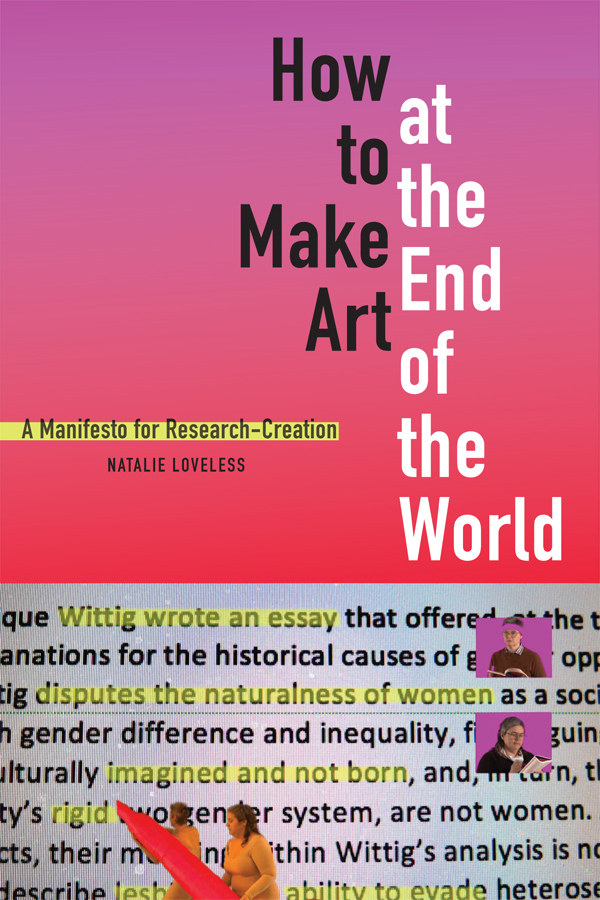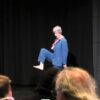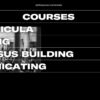This text is licensed under the Creative Commons license Attribution-NonCommercial-ShareAlike 4.0 International. The link to the original material is situated at the top right of the text.

Source: https://www.dukeupress.edu/Assets/Books/978-1-4780-0402-8_pr.jpg (accessed April 30, 2022)
Book
Keywords: research-creation, neoliberal university, situatedness, diversifying learning environments
Threads: Inquiring, (Un)framing Knowledge, Learning
How to make Art at the End of the World: A Manifesto for Research-Creation
Natalie Loveless
2019
Keywords: research-creation, neoliberal university, situatedness, diversifying learning environments
Threads: Inquiring, (Un)framing Knowledge, Learning
Short description
Natalie Loveless draws on diverse perspectives – from feminist science studies to psychoanalytic theory, as well as her own experience advising undergraduate and graduate students – to argue for research-creation as both a means to produce innovative scholarship and a way to transform pedagogy and research within the contemporary neoliberal university. [For her] championing experimental, artistically driven methods of teaching, researching and publication, research-creation works to render daily life in the academy more pedagogically, politically, and affectively sustainable, as well as more responsive to issues of social and ecological justice.
Personal appreciation
Natalie Loveless is presenting a very personal and situated perspective on research-creation and its way to transform contemporary university in this book. She includes several theories, as well as personal experiences as a teacher to argue for the importance of this research mode.
Digging into the idea of interdisciplinarity she introduces an interesting term : polydisciplinamory. For her, working research-creationally has to go beyond the limits of academic disciplines and even interdisciplinary work – central aspects of the research process have to be situatedness, curiosity, care and „the uncanny“.
„[..] to do research – of any kind – is not simply to ask questions ; it is to let our curiosities drive us and allow them to ethically blind us ; it is to tell stories and to pay attention not only to which stories we are telling and how we are telling them, but how they, through their very forms are telling us.“ p. 24
As a young professional in the cultural and educational sector, this book is very inspiring; it opens perspectives for work that goes beyond academic disciplines and the distance between academic and professional sector.
Digging into the idea of interdisciplinarity she introduces an interesting term : polydisciplinamory. For her, working research-creationally has to go beyond the limits of academic disciplines and even interdisciplinary work – central aspects of the research process have to be situatedness, curiosity, care and „the uncanny“.
„[..] to do research – of any kind – is not simply to ask questions ; it is to let our curiosities drive us and allow them to ethically blind us ; it is to tell stories and to pay attention not only to which stories we are telling and how we are telling them, but how they, through their very forms are telling us.“ p. 24
As a young professional in the cultural and educational sector, this book is very inspiring; it opens perspectives for work that goes beyond academic disciplines and the distance between academic and professional sector.
Contribution to the "Who knows?" handbook
Its value is connected to the primary concern of our project : finding ways to research and work that flip knowledge and power structures in academic frameworks and arts and culture – in her book Loveless presents research-creation as the following :
„It is for the insertion of voices and practices into the academic everyday that work to trouble disciplinary relays of knowledge/power, allowing for more creative, sensually attuned modes of inhabiting the university as a vibrant location of pedagogical mattering.“ p. 3
and
„Research-creation is also indebted to a history of academic interdisciplinarity that includes interventions [..] into not only which knowledges might be deemed valuable but who might produce such knowledges and how“ p. 14
This idea of shifting around established structures in the university should, in her opinion, also be part of the teaching and pedagogical framework.
„How we train our students to think about their practices impacts how, and where, and why they move forward toward the futures they are developing. Learning environments impact the kinds of questions that can be asked, and the ways in which students are supported in asking them. As feminist, antiracist, and decolonial theorists have long taught us, pedagogical ideologies – regimes of truth- configure the parameters of legitimate research questions as well as what counts as rigor and excellence for both student and teacher.“ p.13
We are also working on this idea of diversifying and opening up learning environments in our project.
„It is for the insertion of voices and practices into the academic everyday that work to trouble disciplinary relays of knowledge/power, allowing for more creative, sensually attuned modes of inhabiting the university as a vibrant location of pedagogical mattering.“ p. 3
and
„Research-creation is also indebted to a history of academic interdisciplinarity that includes interventions [..] into not only which knowledges might be deemed valuable but who might produce such knowledges and how“ p. 14
This idea of shifting around established structures in the university should, in her opinion, also be part of the teaching and pedagogical framework.
„How we train our students to think about their practices impacts how, and where, and why they move forward toward the futures they are developing. Learning environments impact the kinds of questions that can be asked, and the ways in which students are supported in asking them. As feminist, antiracist, and decolonial theorists have long taught us, pedagogical ideologies – regimes of truth- configure the parameters of legitimate research questions as well as what counts as rigor and excellence for both student and teacher.“ p.13
We are also working on this idea of diversifying and opening up learning environments in our project.
Material(s)
Link to material #1 - (Video file, 1h22, can be watched online with a vimeo account)
Talk : How To Make Art at the End of the World - Natalie Loveless
Natalie Loveless talking about Art in the Anthropocene and the difference of „art on ecology“ and „ecological form“.
Link to material #2 - (Video file, 1h, can be watched online with a vimeo account)
Talk : Situated Practices in Precarious Times - Natalie Loveless
Natalie Loveless talking about ecological form of art discussing Marilyn Arsems performances, Edward Burtynskys photography and Donna Haraways „Situated Knowledges“.
Talk : How To Make Art at the End of the World - Natalie Loveless
Natalie Loveless talking about Art in the Anthropocene and the difference of „art on ecology“ and „ecological form“.
Link to material #2 - (Video file, 1h, can be watched online with a vimeo account)
Talk : Situated Practices in Precarious Times - Natalie Loveless
Natalie Loveless talking about ecological form of art discussing Marilyn Arsems performances, Edward Burtynskys photography and Donna Haraways „Situated Knowledges“.
Additional Information
| Location | USA Duke University Press, Durham |
| Original language(s) | English |
| Existing translations | |
| Length | 129 pages |
| Project runtime | - |
| Institution of affiliation | Duke University |
| Sponsor(s) |
Name of contributor: Sonia Nikitin
Additional Pictures
Creative Commons
Related Contributions

Talk
Searching for the Fountain of Age: A Danced lecture
Susanne Martin
2018
Susanne Martin proposes an alternative way of lecturing and transmitting her knowledge with a very situated approach : To look and sense her research object, the “fountain of age”, she divides it into 2 smaller fountains : the Fountain of Knowledge (talking) and the Fountain of Experience (dancing).

Project
Anthropocene Curriculum
Haus der Kulturen der Welt, List of Contributors
2013
What should a body of “earthbound” knowledge contain that traverses from the global to the local and back?







